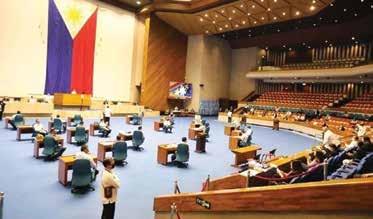
5 minute read
Comelec needs P3.8B more for con-con
push for Cha-cha.
Binay said if Padilla favors the easing of the restrictive economic provisions of the Constitution, the landmark amendments to the Public Service Act, Foreign Investment Act and the Retail Trade Liberalization Act are sufficient to attract investments.
Advertisement
She said more effort should be put into improving and releasing the implementing rules and regulations of these laws instead “in the face of the many crises confronting us.”
Senate Minority Leader Aquilino Pimentel III said Filipinos are “too preoccupied with daily living struggles” to give a thought to Cha-cha. “Although we need constitutional changes to improve our system of government, this can wait as we should address first the basic daily living problems: where to get food to feed the family, the continued increase in prices, where to get a job, corruption, the high cost of living and even of dying, and many more basic problems,” Pimentel said.
Sen. Sonny Angara said he was open to amending the Constitution, but he was concerned over the proposal of the House of Representatives to do it through constitutional convention (con-con), whose members are to be elected.
He said the con-con is the most expensive and the most tedious mode of Charter change, adding the proposed P10,000 per day pay of each delegate was excessive.
Padilla said while he is heartened over the efforts in the House to amend the Constitution, he appealed anew to them to prioritize amending the economic provisions.
Several groups in the House of Representatives, led by the Party-list Coalition Foundation Inc., have rejected Padilla’s call to abolish the party-list system.
Rep. France Castro of ACT Teachers acknowledged flaws in the Party-List System Law, but said the marginalized sector still needs representation.
“The party-list system should not be abolished. The law should be amended to ensure that only party-list groups from the marginalized sector are the ones who get registered and elected,” Castro said. (With reports from Paolo Romero)
THE Commission on Elections (Comelec) will need an additional P3.827 billion to hold an election for constitutional convention (con-con) delegates, Comelec Chairman George Garcia said on Tuesday, February 28.
The election of delegates is planned to be held simultaneously with the barangay and youth council polls on October 30.
Garcia told the House Committee on Appropriations the additional budget will fund the bigger honoraria being proposed for teachers who will be doing poll duty.
He also said that 67 million ballots have to be printed for the election of con-con delegates.
Last week, the House Committee on Constitutional Amendments approved a Resolution of Both Houses (RBH) calling for a con-con to amend or revise the 1987 Constitution.
If the House adopts the RBH, it must also be approved by the Senate.
Under a bill approved by the House constitutional amendments committee during a meeting on Monday, February 27, one delegate per legislative district shall be elected to the con-con.
Sectoral representatives, who will make up 20 percent of the convention delegates, would be jointly appointed by the Senate president and the House speaker.

A con-con delegate must be a natural-born Filipino citizen, at least 25 years old on election day, a college degree holder, a registered voter in the concerned district, and a resident there for at least a year immediately preceding elction day.
A sectoral delegate must be a natural-born Filipino citizen and at least 25 years old on the day of his appointment.
The bill requires the concon to have as delegates at least three retired members of the judiciary, two economists, two from the labor sector, two from the farmers and fisherfolk, two from indigenous cultural communities, and two from the senior citizens and persons with disabilities, among others.
During the constitutional amendments committee’s meeting on Monday, Cagayan de Oro Second District Rep. Rufus Rodriguez, the committee chairman, said “what is envisioned here is that there will be nominations from different sectors and then the nominations will be submitted to the speaker and submitted also to the Senate president, so that then each one of them will consider the nominations and then they will have to meet and be able to have” a joint approval “on whom both of them will appoint.”
The delegates will serve from Nov. 21, 2023, to June 30, 2024. The convention will be held in the House session hall. It must submit its report to Congress and the Comelec within 30 days from completion of the consolidated amendments, or July 30, 2024. The amendments to the Constitution proposed by the convention must be ratified by a majority of the votes cast in a plebiscite to be held within 90 days after the submission of the convention report. (ManilaTimes.net)
Expanded discount for senior citizens approved

THE House Special Committee on Senior Citizens has approved bills that will expand the provision of a 20 percent discount and exemption from value-added tax to senior citizens to include medicines, dietary supplements, vitamins, herbal products and formulated milk that have been properly prescribed or recommended by physicians.
House Bills 362 and 5425, authored by OFW party-list Rep. Marissa Magsino and Manila First District Rep. Ernesto Dionisio Jr., respectively, were approved by the House committee and will be consolidated.
Magsino welcomed the committee's decision and said that her bill will benefit many senior citizens who are forced to fend for themselves with their little life savings and pensions, which are largely used for personal expenses and medical needs, and the most disadvantaged have become street dwellers, begging for a living. She said that the Constitution requires both the family and the government to care for elderly members through social programs.
In response to this constitutional directive, Congress passed Republic Act 7432, or the "Senior Citizens Act," which was later revised by RA 9257 and RA 9994, or the "Expanded Senior Citizens Acts of 2003 and 2010," respectively.
Senior citizens are offered a 20 percent discount on certain products and services, such as medicines, as well as a 12 percent value-added tax exemption under this succession of laws.
Yet, these laws failed to provide for a definition of the term "medicines, which would identify specifics of their coverage, thus allowing many business establishments the leeway to determine which types of medicines are subject to the discount, and in many instances deny the grant of the privilege," Magsino said during her sponsorship speech.
"Moreover, the present laws do not include supplements and vitamins, formulated milk and other similar products that have proven important, especially during the pandemic, in maintaining the well-being of senior citizens," she added.
House Bill 362 proposes defining "medicines" as drugs, both prescription and nonprescription, generic and branded, duly prescribed by physicians and approved by the Department of Health and the Food and Drug Administration, to be used in the diagnosis, cure, mitigation, treatment or prevention of illness. The bill intends to include dietary supplements, herbal products and formulated milk that have been officially prescribed by physicians, approved by the DoH and utilized in the diagnosis, cure, mitigation, treatment or prevention of disease.
"The amount of care that a society extends to its elderly members is a measure of the humaneness that particular society possesses. We Filipinos are known for our culture of cherishing and personally taking care of our elderly. Let us keep that distinction and pride alive," Magsino said. (ManilaTimes.net)








